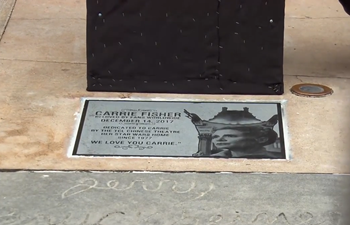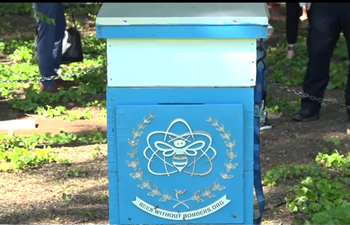WASHINGTON, May 28 (Xinhua) -- The Trump administration's recent investigation into automotive imports has provoked widespread opposition from U.S. lawmakers, business groups and major trading partners, as they think the unilateral move threatens to disrupt global supply chains and kill American jobs.
Under instruction from President Donald Trump, the U.S. Commerce Department last week initiated a so-called Section 232 investigation into the national security implications of automobile imports, including sport-utility vehicles, vans and light trucks, and automotive parts.
The investigation was based on a rarely-used Section 232 of the Trade Expansion Act from 1962, which could lead to as much as 25 percent of tariffs on automobile imports.
The Trump administration had used the same domestic law to impose additional tariffs on steel and aluminum imports in March amid mounting dissent from business groups and trading partners around the world.
"The Section 232 tariffs on steel and aluminum imports have harmed the U.S. economy, resulting in higher costs on U.S. businesses and consumers, and exposing U.S. exporters to foreign retaliation," the Business Roundtable, an association of chief executive officers of America's leading companies, said Thursday in a statement.
"Imposing such tariffs on automobile and automotive parts imports would only make things worse," the business association warned, adding it would also double down on a bad precedent for U.S. trade policy.
"It undermines our nation's credibility in the global community, weakens the international trading system, and emboldens other countries to use national security to limit U.S. goods and services exports to their markets," said the Business Roundtable.
The U.S. Chamber of Commerce, the largest business group in the country, also strongly opposed the Trump administration's threat to impose tariffs on auto imports in the name of national security.
"If this proposal is carried out, it would deal a staggering blow to the very industry it purports to protect and would threaten to ignite a global trade war," Thomas J. Donohue, president and CEO of U.S. Chamber of Commerce, said in a statement.
Auto manufacturers have argued that the U.S. auto industry doesn't need tariff protection and such restrictions would adversely impact the industry and American consumers.
"Contrary to the assumption underlying the investigation on import vehicles, the U.S. auto industry is thriving. To our knowledge no one is asking for this protection," said John Bozzella, CEO of Global Automakers, which represents foreign automakers doing business in the United States.
"If these tariffs are imposed, consumers are going to take a big hit because they will have fewer vehicle choices and higher car and truck prices," Bozzella said, adding this course of action will undermine the health and competitiveness of the U.S. auto industry.
Larry Kudlow, director of the White House National Economic Council, also worried that such auto tariffs would hurt American consumers and probably have a negative effect on American jobs, according to U.S. news website Axios.
"He (Kudlow) pointed out that foreign automakers employ Americans in states like Alabama and Kentucky. And he said domestic auto dealers, factories and auto servicing businesses in the U.S. would potentially be hurt by these tariffs," Axios reported Sunday, citing sources with knowledge of the sensitive discussions inside the Trump administration.
Influential Republican lawmakers, including Senate Finance Committee Chairman Orrin Hatch and Foreign Relations Committee Chairman Bob Corker, have urged the administration to drop such investigation into automotive imports.
"There is no reason to use this provision to consider imposing tariffs on the automobile industry ... This is a dangerous course and should be abandoned immediately," Corker said in a statement Thursday.
American major trading partners have also expressed concerns that tariffs would hit auto manufacturers as well as parts suppliers based overseas, disrupt global supply chains and violate rules of the World Trade Organization (WTO).
"We oppose abusing the clause on national security, because such an abuse would sabotage the multilateral trading regime and disrupt the normal international trading order," Chinese Foreign Ministry spokesman Lu Kang said last week.
European Commission Vice-President Jyrki Katainen said "it's very difficult to understand" the U.S. investigation into vehicle imports under the Section 232.
"If now U.S. would unilaterally raise car tariffs for instance, it obviously would be against the WTO (rules) and it's very difficult to imagine it to create any sort of threat to national security," he told a news conference Thursday.
Japanese Trade Minister Hiroshige Seko also warned that Washington's latest move towards unilateral protectionism would "plunge the global market into turmoil," noting any trade measures must be consistent with the WTO's multilateral trade system.
Phil Levy, a senior fellow on the global economy at The Chicago Council on Global Affairs, believed that other countries will retaliate if the U.S. moves forward its tariff plan on imported automobiles.
"If the Trump administration hits a large fraction of those imports with tariffs there is the potential for a very sizeable retaliatory backlash," Levy said, adding countries are likely to target those American sectors they consider vulnerable or politically sensitive, including American agriculture.
U.S. imported 193 billion U.S. dollars of new passenger vehicles in 2017, 24 percent of which were from Mexico, 22 percent from Canada, 22 percent from the Europe Union (EU), and 21 percent from Japan, according to Chad Bown, a senior fellow at the Peterson Institute for International Economics.
In terms of U.S. unilateral tariffs on steel and aluminum imports, Japan, the EU and other U.S. trading partners have challenged it at the WTO. The United States is likely to face similar legal challenges at the WTO for its potential tariffs on auto imports, according to trade experts. Enditem













